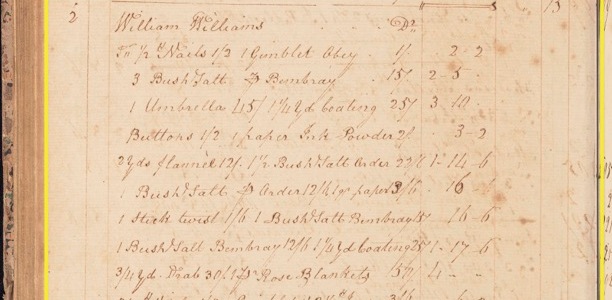I think I have exhausted available resources on my favorite brickwall ancestor for the moment. I also find it’s a good idea to step back once in a while, work on something else, and see what comes up in the meantime. However, I’ve discovered a few more details over the last few weeks that I want to note.
I researched some additional records from David Clark’s mercantile at Hogston, a former settlement located near Hamilton in Martin County, NC. There, I found several references to Miles in connection to a wealthy and prominent planter named William Williams. Here is an example, from 29 January 1802.

It’s unclear exactly what these references mean, however, as they are repeated several times it appears that Miles was connected to William Williams in some way. As Williams held close to 100 slaves, and I know that Miles later worked as an overseer for David Clark, it seems likely that he could have worked for William Williams in that capacity.
William Williams also lived very near to Miles Bembry in Martin County in 1790, and held a lot of land and slaves in neighboring Bertie county. So, it could be that Miles Bembry’s mysterious appearance as the “owner” of 69 slaves in Bertie County in 1800 means that he was overseeing Williams’ plantation at that time. I think it’s a good working theory, but I haven’t yet found any actual evidence to support it. (Much later, in 1832, Williams’ son, John David Williams, guaranteed a debt for Miles, indicating an ongoing association.)
William Williams’ daughter, Martha Boddie Williams, was the wife of William McKenzie, and adoptive mother to the four sons of William McKenzie’s sister, Janet McKenzie and Colin Clark. So, once again, the trail leads back to the McKenzie/Clark clan. I can’t say as I am surprised by this!
Later, in 1804 and 1806, records from David Clark’s Hamilton mercantile show payments from Miles Bembry on a “note” or loan. The previous year, Miles had purchased 100 acres of land in two tracts. I think that this probably means that he got rolling on his own small plantation at around this time, therefore, he had his own account at the mercantile.

One interesting note about these records is that they add to the considerable number of early instances in which Miles’ name is spelled (and presumably pronounced) “Bembray” by people who knew him well: his neighbors and employers. His father in law also refers to his wife as “Ann Bembray” in his 1797 will. So, it certainly seems that Miles called himself Bembray until he was in his fifties, when the name morphs into “Bembry,” probably due to North Carolina pronounciation patterns. Though Bembray is just as obscure as Bembry, I’m inclined to think this is a Scots or Irish surname due to the -ay ending in common with names such as Murray, Cannaday, Finlay, etc.
Getting back to the Clarks, I noticed one other item of interest. Colin (or Cullen) Clark, father of David, Kenneth, John and William McKenzie Clark, had either a brother or uncle named Thomas Clark. Both came from Limekilns, Dumfrieshire, Scotland, and both lived in Bertie County until the late 1770s, conducting business together until Thomas died (about 1779), and Colin went back to Scotland (about 1778), leaving his wife and family behind in North Carolina. (Thomas Clark also had a son named Thomas Clark who remained close to Colin’s children, as demonstrated in probate files and other documents. John McKenzie Clark was his estate administrator, for example.)
Miles named his sons John, William, Thomas and Kenneth. These are not especially unusual names however, I had not known about Thomas Clark before, and I do think it worth noting that all of Miles’ sons names are found in a previous generation of the Clark family. And both Thomas and Colin were around at the right time to have fathered Miles, who was born about 1770–yet would have been out of the picture by the time he was a young boy.
In summary, this latest round of research into Miles has shown further ties, both real and circumstantial, to the McKenzies, Clarks, and related families. I still don’t know exactly how Miles is connected to them but I feel that there is something going on there. I’ll set this aside now, let it “simmer” for a while, and see what may come up later.

If only Miles knew that you were going to be so interested, he might have left a better crumb trail. You certainly leave no stone unturned. Keep looking.
LikeLiked by 1 person
Do you have a document written by Miles that shows how he spelt his name? I agree with your reasoning, but a document in his own handwriting would be invaluable.
LikeLiked by 1 person
Excellent question! I do have one, but it is from late in his life. I believe he was illiterate and only later learned to sign his name. That one says “Bembry” however, the name had morphed into that on all the other documents by that time. Earlier on, I believe other people most likely wrote his name based on how he pronounced it.
LikeLike
Kelly, dear cousin, in many documents the surname is purposefully spelled differently for several reasons: 1) to differentiate between siblings and generations of the same larger family 2) to show the many ways it may have been transcribed by Clerk of the Courts in formal legal records, 3) sounding of surname. Your research is spot on and I am enjoying learning all about Thomas N and Miles and Ann Bryan Bembry. In Martha Bembry Kellam’s obituary, her surname is spelled Bembry. Agree with you that the Scots-Irish spelling with “ry” lends itself to those locations. Would love to connect with the Bembry and Bryan families. Thank you, Bren Kellam Schilling
LikeLike